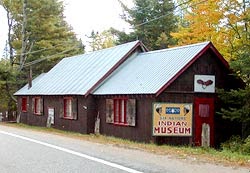Basket-topped sticks resembled a stand of cat tails, the precursors of today's lacrosse sticks.
But the most interesting artifact wasn't an artifact.
The guide.
He was scanning his phone when we entered the room and after a while asked if we had any questions. Quiet, observant, and wearing a worn denim shirt, he looked like anyone else, except for his shorn head and waist length braid which grew from a small patch at the base of his neck.
In the next room I was reading the Creation Story when I heard him talking.
I wondered about the museum. Disorganized and cluttered, it seemed a haphazard collection in need of a curator. A letter on the wall addressed the First Nation people about the decline of their culture and way of life. Thomas Jefferson and Ben Franklin headed a poster across the room, acknowledging the Iroquois Confederacy's influence on our fledging democracy, their freedom of speech and belief in elections, principles of a league of Native Americans dating back to the 15th century.
The Iroquois Confederacy was a name given by the French; they call themselves the Haudenosaunee or the "people of the long house" and the English called them the League of Five Nations. The nations from west to east are Seneca, Cayuga, Onondaga, Oneida, and Mohawk and they lived in the region of present day New York State. The union of the five nations dates 200 years before our democracy with the sixth nation, the Tuscarora, joining in the 1700s.

The museum guide belongs to the Mohawk nation and his name means Mountain Snow. His grandmother gave him this name, a right held by the oldest woman in the clan. Unlike western tribes, the name is not earned but given at birth. Men marry and move into the woman's tribe.
"Snow" explained that the Haudenosaunee women elect their chiefs and have the right to impeach them after three warnings.
They settled disputes by playing a game which could cover a mile and last days and evolved into the modern sport of lacrosse. Young men have energy Snow said, and they could burn it off this way without war and death. Fleet-footed messengers ran relays across the five nations form Buffalo to Albany, 240 miles in three days. Runners created foot trails, paving the paths for centuries, paths which became today's roads and highways. (Running systems, American Indian link)
 |
| Mohawk or Iroquois Trail, Link to history of trail |
Snow pointed to a map on the wall of the Iroquois/Mohawk foot trails, well worn paths which became the routes for the colonists, settlers, and traders. He also pointed out the wampum belts constructed from white and purple beads which were carved from quahog and whelk shells. An important record of significant events and history, the belts tell a story.
 |
| Iroquois Five Nations wampum belt |
The flag of the Iroquois represents the Hiawatha wampum belt. The belt is comprised of thirty eight rows, having a heart as a great tree in the center, on either side there are two squares, all are connected with the heart by white rows of wampum. The belt is the emblem of unity among the Five Nations. Iroquois Nationals Lacrosse site, Read more here.
The English language, Snow explained, is linear but Iroquois is different. Symbolic and at times concentric in its depiction, the language consists of pictographs. He pointed to a belt tacked along the top of the wall which encircled the room and said it would take three days to tell that story.
The vast collection of artifacts and stories belonged to Snow's grandfather, Ray Fadden or Tehanetorens who established the museum. On some visits, a guide or docent will tell a legend or story from the wampum belts. "The Story of the Monster Bear, the Giant Dipper" is shared here along with the pictographs, explaining the familiar constellation. (Link to Iroquois legend of the Great Bear)
I purchased two of his books, Legends of the Iroquois and the Roots of the Iroquois. (Link to books on Goodreads)
In the closing chapter of the first book, Nadine Jennings wrote:
Some exhibits originated in the early days of the museum; some are new. Once seated on narrow wooden benches, surrounded by more exhibits than one could possibly absorb in a single afternoon, visitors are treated to "messages" delivered by a member of the Fadden family. These messages stress the contributions made by Native Americans to American culture and life style, such as foods, medicines, and the American form of government. (Legends of the Iroquois, p. 108)
This was my reaction to the sheer volume of stuff in this four room long building. How much better would it be if it were presented differently? Is it complete, fair, and accurate? Museums present skewed information and this is perhaps no different.
But the "message" resembled the messenger: quiet, thoughtful, full of history. The presentation was not linear or organized like U.S. museums. But it makes me rethink my understanding of "American" history.
 |
| Six Nations Indian Museum, link to site |


















